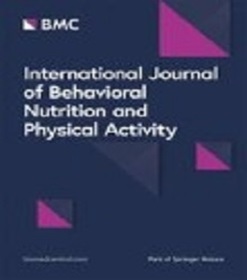Leveraging continuous glucose monitoring as a catalyst for behaviour change: a scoping review
IF 5.6
1区 医学
Q1 NUTRITION & DIETETICS
International Journal of Behavioral Nutrition and Physical Activity
Pub Date : 2024-07-10
DOI:10.1186/s12966-024-01622-6
引用次数: 0
Abstract
Amidst the escalating prevalence of glucose-related chronic diseases, the advancements, potential uses, and growing accessibility of continuous glucose monitors (CGM) have piqued the interest of healthcare providers, consumers, and health behaviour researchers. Yet, there is a paucity of literature characterising the use of CGM in behavioural intervention research. This scoping review aims to describe targeted populations, health behaviours, health-related outcomes, and CGM protocols in randomised controlled trials (RCTs) that employed CGM to support health behaviour change. We searched Ovid MEDLINE, Elsevier Embase, Cochrane Central Register of Controlled Trials, EBSCOhost PsycINFO, and ProQuest Dissertations & Theses Global from inception to January 2024 for RCTs of behavioural interventions conducted in adults that incorporated CGM-based biological feedback. Citation searching was also performed. The review protocol was registered ( https://doi.org/10.17605/OSF.IO/SJREA ). Collectively, 5389 citations were obtained from databases and citation searching, 3995 articles were screened, and 31 were deemed eligible and included in the review. Most studies (n = 20/31, 65%) included adults with type 2 diabetes and reported HbA1c as an outcome (n = 29/31, 94%). CGM was most commonly used in interventions to target changes in diet (n = 27/31, 87%) and/or physical activity (n = 16/31, 52%). 42% (n = 13/31) of studies provided prospective CGM-based guidance on diet or activity, while 61% (n = 19/31) included retrospective CGM-based guidance. CGM data was typically unblinded (n = 24/31, 77%) and CGM-based biological feedback was most often provided through the CGM and two-way communication (n = 12/31, 39%). Communication typically occurred in-person (n = 13/31, 42%) once per CGM wear (n = 13/31; 42%). This scoping review reveals a predominant focus on diabetes in CGM-based interventions, pointing out a research gap in its wider application for behaviour change. Future research should expand the evidence base to support the use of CGM as a behaviour change tool and establish best practices for its implementation. doi.org/10.17605/OSF.IO/SJREA.利用持续葡萄糖监测促进行为改变:范围界定审查
在与血糖相关的慢性疾病发病率不断上升的背景下,连续血糖监测仪(CGM)的进步、潜在用途和日益普及引起了医疗保健提供者、消费者和健康行为研究人员的兴趣。然而,有关 CGM 在行为干预研究中的应用的文献却很少。本范围综述旨在描述采用 CGM 支持健康行为改变的随机对照试验 (RCT) 中的目标人群、健康行为、健康相关结果和 CGM 方案。我们检索了 Ovid MEDLINE、Elsevier Embase、Cochrane Central Register of Controlled Trials、EBSCOhost PsycINFO 和 ProQuest Dissertations & Theses Global(从开始到 2024 年 1 月)中有关成人行为干预的 RCT,其中纳入了基于 CGM 的生物反馈。同时还进行了引文检索。审查协议已注册 ( https://doi.org/10.17605/OSF.IO/SJREA )。通过数据库和引文检索共获得 5389 条引文,筛选出 3995 篇文章,其中 31 篇被认为符合条件并纳入综述。大多数研究(n = 20/31,65%)纳入了成年 2 型糖尿病患者,并将 HbA1c 作为结果进行了报告(n = 29/31,94%)。CGM 最常用于针对饮食变化(n = 27/31,87%)和/或体育锻炼(n = 16/31,52%)的干预。42%(13/31)的研究提供了基于 CGM 的前瞻性饮食或活动指导,61%(19/31)的研究提供了基于 CGM 的回顾性指导。CGM 数据通常是非盲的(n = 24/31,77%),基于 CGM 的生物反馈通常通过 CGM 和双向交流提供(n = 12/31,39%)。沟通通常是当面进行(n = 13/31,42%),每次佩戴 CGM 时进行一次(n = 13/31;42%)。本次范围界定审查显示,基于 CGM 的干预措施主要关注糖尿病,指出了在更广泛应用 CGM 改变行为方面存在的研究空白。未来的研究应扩大证据基础,以支持将 CGM 用作行为改变工具,并为其实施确立最佳实践。
本文章由计算机程序翻译,如有差异,请以英文原文为准。
求助全文
约1分钟内获得全文
求助全文
来源期刊
CiteScore
13.80
自引率
3.40%
发文量
138
审稿时长
4-8 weeks
期刊介绍:
International Journal of Behavioral Nutrition and Physical Activity (IJBNPA) is an open access, peer-reviewed journal offering high quality articles, rapid publication and wide diffusion in the public domain.
IJBNPA is devoted to furthering the understanding of the behavioral aspects of diet and physical activity and is unique in its inclusion of multiple levels of analysis, including populations, groups and individuals and its inclusion of epidemiology, and behavioral, theoretical and measurement research areas.

 求助内容:
求助内容: 应助结果提醒方式:
应助结果提醒方式:


